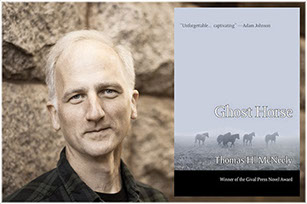Connecting readers, books, authors, writers, publishers, booksellers, and others interested in Texas books and letters

Lone Star Book Reviews
By Richard Jespers
A resident of Lubbock, Texas, Richard Jespers holds the MA in English from Texas Tech University. He is the author of short fiction in numerous journals and the collection My Long-Playing Records and Other Stories (2014).
Lone Star Book Reviews
of Texas books appear weekly
at LoneStarLiterary.com
Thomas H. McNeely is a former Stegner Fellow and Jones Lecturer in fiction at Stanford University whose work has appeared in The Atlantic, Ploughshares, The Virginia Quarterly Review, and Epoch, and has been anthologized in The Best American Mystery Stories; What If?: Writing Exercises for Fiction Writers; and Algonquin Books’s Best of the South: From the Second Decade of New Stories from the South.
He has received fellowships from the National Endowment for the Arts, the Dobie Paisano Program at the University of Texas at Austin, and the MacDowell Colony. He currently teaches in the Stanford Online Writers’ Studio and the Emerson College Honors Program.
Ghost Horse, his first novel, was winner of the 2013 Gival Press Novel Award and published in 2014.
Gival Press
Trade paper, 978-1-928589914
260 pages, $20.00 (also available in ebook format)
2014
Reviewed for Lone Star Literary Life by Richard Jespers
 At first, Thomas McNeely’s novel Ghost Horse, set in 1970s Houston, is frustratingly inscrutable. What is the meaning of this bit of conversation twelve-year-old Buddy overhears between his parents? Why doesn’t his real father—the one Buddy knows before the man goes off to Louisiana to finish med school—return to their home, the one where his Mom lives? Perhaps the author wishes for the reader to sense the utter confusion that is aroused in a child when his parents inexplicably decide to separate. Who wants “this?” the author repeats over and over again, his mother or his father? He says she does; she says he does. Each parent tries to build an alliance with Buddy, one that is exclusive of the other adult.
At first, Thomas McNeely’s novel Ghost Horse, set in 1970s Houston, is frustratingly inscrutable. What is the meaning of this bit of conversation twelve-year-old Buddy overhears between his parents? Why doesn’t his real father—the one Buddy knows before the man goes off to Louisiana to finish med school—return to their home, the one where his Mom lives? Perhaps the author wishes for the reader to sense the utter confusion that is aroused in a child when his parents inexplicably decide to separate. Who wants “this?” the author repeats over and over again, his mother or his father? He says she does; she says he does. Each parent tries to build an alliance with Buddy, one that is exclusive of the other adult.
To save himself, not really aware of his motivation, Buddy sets out to make an animated film about a horse with his friend, Alex Torres, a boy he’s befriended in his old neighborhood, where he has attended a school named Queen of Peace. Even though his father now pays for him to attend an all-white school, St. Edwards, he continues to see Alex and work on the film.
But all sorts of forces pull against him. There’s the horse that is constantly circling in the skies overhead, ready to pounce on Buddy’s enemies, yet is startlingly impotent when it comes to delivering real aid. Both of his grandmothers pull at him, tempting him to do one thing or another that will help him grow up into a fine man. His mother pulls at him. His father pulls at him. His father’s female friend, Mary, urges him to leave his mother and live with them. The boys at St. Edwards attempt to initiate him into their comfortable world of long, gold cars and spacious brick homes. But Buddy is no longer comfortable anywhere, not at his mother’s place, nor at his grandmother’s, where his estranged father stays in the very room in which he spent his boyhood, while his own father lies dying but a few feet away. Buddy Turner is so uncomfortable that he begins to act out in violent, erratic ways that are not like the old Buddy.
The author artfully incorporates a number of motifs that help to create Buddy’s interior world: some murdered boys buried in a nearby field nearly speak to him in the manner of a Greek chorus; his father’s girlfriend is filled with “vampire venom” and is out to infect him and others; in early home movies of Buddy, his father “disappears”; the whole world is an insane joke to Buddy.
McNeely has created one long cloudy, gray day in the Houston, Texas, of 1975—a period of painful transition from old southern city to the vibrant metropolis of today. He must repeat the word “ghost” or its derivatives scores of times. Though the experience is uncomfortable for readers, McNeely wishes for them to undergo the hell of a child living through his parents’ divorce. And in great measure he succeeds.
* * * * *

![]()
![]() LONE STAR LITERARY LIFE copyright © 2015–18 Paragraph Ranch LLC • All rights reserved • CONTACT US
LONE STAR LITERARY LIFE copyright © 2015–18 Paragraph Ranch LLC • All rights reserved • CONTACT US

